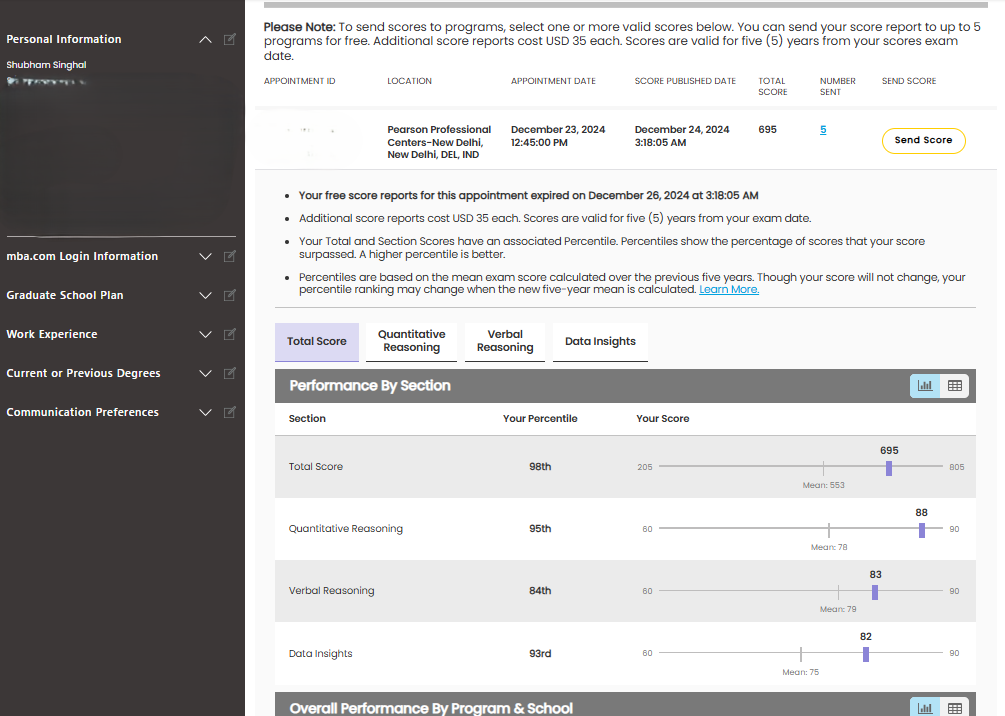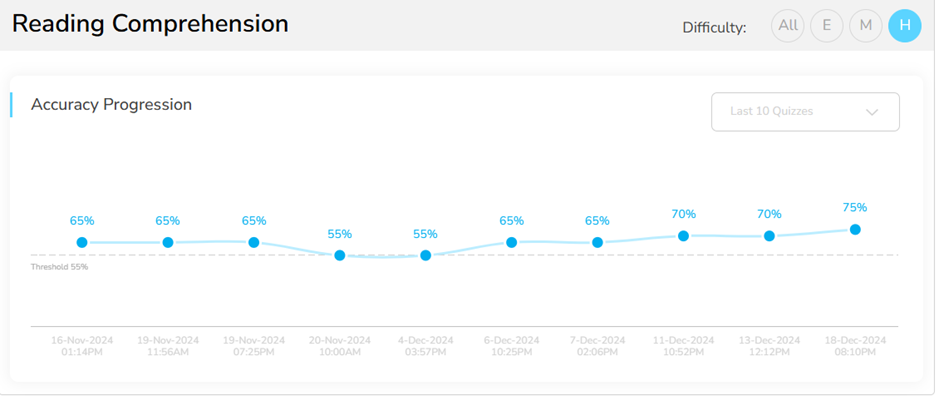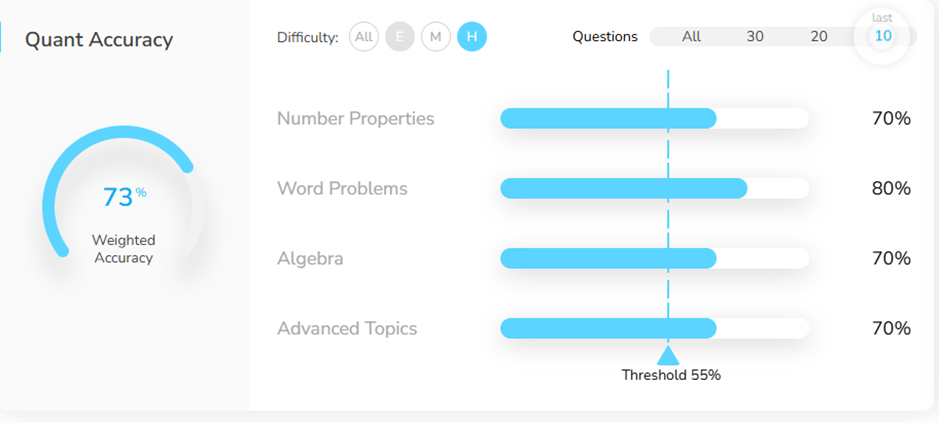Hello GMAT Club Members,
I wanted to share my GMAT journey with you all, hoping it might help others who find themselves stuck at score plateaus. Recently scored a 695 (Q88, V83, DI82), and the path here wasn't straightforward.

What made the difference? After struggling with my initial approach, I found my breakthrough with
e-GMAT's structured preparation method. The journey had two distinct phases, and the contrast between them taught me valuable lessons about GMAT preparation.
Journey in a SnapShot:· Starting Score – 595 (Q84, V78, DI77)
· GMAT First Attempt – 635 ( Q88, V78, DI78 )
· GMAT Final Attempt – 695 (Q88, V83, DI 82)
Phase 1: The Initial Struggle (595 to 635)My journey began with a 595, and despite months of preparation, I could only improve to 635. I had subscribed to a test prep provider and was trying to solve as many questions as possible. However, I lacked a systematic approach, especially in Verbal and Data Insights. Looking back, I was practicing without really learning or improving.
Phase 2: The Breakthrough (635 to 695)Everything changed when I switched to
e-GMAT. Initially, I was skeptical about starting another course, but the structured format and comprehensive study plan made sense from day one.
Verbal Improvement – V78 – V83:I discovered that my approach needed a complete overhaul. For Critical Reasoning, I learned to treat it like a skill that could be systematically developed - similar to Quant. The pre-thinking approach was challenging at first, but with practice, it became second nature.
The biggest transformation came in Reading Comprehension. I had been reading passages like an engineer - trying to absorb every detail. My biggest takeaway was to
stop reading like an Engineer, but to start reading like a manager - focusing on the main message and the author's purpose. I started asking "Why is the author telling me this?" instead of "What are they telling me?" My accuracy jumped from 55% to 75% within weeks. Not by reading faster or taking better notes, but by actually understanding what mattered.
I went from dreading RC passages to actually enjoying them:
 DI Improvement – DI 78 – DI 82
DI Improvement – DI 78 – DI 82For Data Insights, completing my verbal improvement before diving deep into DI, was really useful. So, after Verbal, I jumped to DI – here building ability individually across each kind of question helped in finally improving my DI score. Here is how approached this:
Started with GITA and TPA, which helped build my foundation. One key learning was realizing that spending time understanding the presented data thoroughly at the start saved time in answering subsequent questions. Initially, I used to jump into questions immediately, often missing crucial information. With practice, I developed the habit of taking a step back to grasp the overall data relationships first.
MSR was my next focus, particularly verbal-type questions which were initially quite challenging. My improved verbal skills came in handy here - approaching these questions like RC passages helped tremendously. For numerical MSR questions, I learned to quickly identify which sources contained relevant information rather than trying to analyze everything at once.
For DS questions, I applied my strong quant foundation while being extra careful about question constraints. The practice questions on the platform helped me handle increasingly complex scenarios, especially those requiring data from multiple sources.
What really helped was revising questions I got wrong until I could solve them confidently. Initially, I thought revisiting questions wouldn't help since I already knew the answers. However, solving them multiple times improved my speed and accuracy, preparing me for similar patterns on test day.
Maintaining Q88:In Quant, while my Q88 was strong, maintaining it required focused effort. The cementing quizzes helped reinforce concepts, and the challenging practice questions prepared me well for test day.

While I was initially sceptical as to why I was practicing on such tough questions, on the test day, I realized the value of this practice. Even though I scored a Q88 in both the attempts, the Quant this time was way tougher. Thank god I practiced on the Scholaranium questions – else scoring Q88 would not have been possible.
The Last Mile Push program with Rashmi as my mentor was a game-changer. She helped identify specific areas needing improvement and created targeted study plans.
Along with these plans, I am very glad that Rashmi dissuaded me from taking the test within 10-15 days of joining
e-GMAT! I was in a hurry, but she explained that we more time to work on verbal and DI – and suggested that I first work on these areas and when I start hitting with 10 points of my target score in mocks, to book the test! I am glad that I followed this suggestion😊
Mock Tests and Test ReadinessI knew I was ready when I started scoring consistently in the 675-695 range on official mocks. (GMAT Official Mocks: 1 – 695, 685, 655, and 675)
But more than the scores, it was the confidence in my approach that told me I was prepared.
Test Day ExperienceThe actual test experience was quite different from my mocks. After starting with Quant, I encountered unexpectedly challenging questions very early - around the 5th or 6th question. This was concerning as Quant was my strong suit, and I found myself spending more time than usual on these questions. At one point, there were two questions I wasn't fully confident about, but I knew I had to move on. With about 5 questions left and only 7 minutes remaining, I had to significantly pick up my pace.
This initial challenge affected my mindset, and I decided to take a break after Quant to reset my focus. During the break, I reminded myself that this was my chance to excel in the other sections, even if Quant hadn't gone exactly as planned.
Verbal threw another surprise. Instead of the usual mixed pattern of CR and RC questions I was used to from mocks, I got five consecutive CR questions, followed by four RC passages back-to-back. This unexpected sequence initially threw me off, but I remembered to trust my preparation. I told myself that while the pattern was different, the questions themselves were similar to what I had practiced extensively.
The DI section had its own challenges. I faced two consecutive verbal-type MSR questions - something I hadn't encountered in my mocks. However, the extensive practice I had done with similar questions on the
e-GMAT platform had prepared me well. I stuck to my approach of reading the questions carefully and analyzing the data systematically, just as I had practiced.
What made the difference that day was maintaining composure despite these surprises. Rather than letting the unexpected patterns or difficult questions shake my confidence, I focused on taking one question at a time and trusting in my preparation. This mindset, along with the rigorous practice with challenging questions during my preparation, helped me navigate through these unexpected situations successfully.
Key TakeawaysThe most important lesson was that the right approach and mentorship make all the difference. Consistency in preparation and belief in yourself are crucial, especially on challenging days. The GMAT tests your thinking process more than your knowledge and having a systematic approach to develop these thinking skills is key.
I'm grateful for the guidance and support I received throughout this journey. Feel free to ask any questions - happy to help!
Good luck with your preparation!
Best regards,
Shubham
Attachment:
 GMAT-Club-Forum-bbamsifb.png [ 138.96 KiB | Viewed 450 times ]
GMAT-Club-Forum-bbamsifb.png [ 138.96 KiB | Viewed 450 times ]
Attachment:
 GMAT-Club-Forum-ge8nyx4s.png [ 51.5 KiB | Viewed 449 times ]
GMAT-Club-Forum-ge8nyx4s.png [ 51.5 KiB | Viewed 449 times ]
Attachment:
 GMAT-Club-Forum-ow8xrgri.png [ 81.51 KiB | Viewed 450 times ]
GMAT-Club-Forum-ow8xrgri.png [ 81.51 KiB | Viewed 450 times ]


















